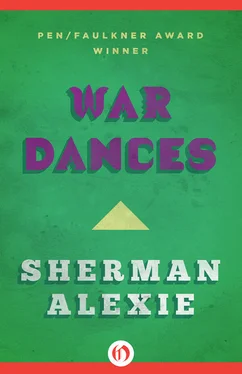Thus hired on the basis of one word — one universal concept — Sherwin tried to transform a tragedy into a redemptive action-adventure movie. How did he go about his task? First he pulled the story out of the past and reset it in the present. Why? Because the studio thought the audience wouldn’t watch another period piece, and because the director — an old studio pro who was rumored to have had sex with at least three of the actresses who’d starred in Dallas, the TV series — wanted his Chinese girlfriend to play the female lead. Ah, the things one does for diversity!
But in changing the time frame of the Sirois Canyon fire at the behest of the capitalistic studio and the love-struck director, Polatkin was confronted with a logical problem. If the fictional Wayne Ford were to set an escape fire in 2003 and still be ignored by his crew members for such a crazy idea, Polatkin would have to pretend that forest-fire fighters still didn’t know about escape fires. This, of course, was a nasty insult to the intelligence of firefighters. So Polatkin only had one option. He had to change the narrative and eliminate Wayne Ford’s escape fire — or, rather, the concept of a man setting the first escape fire in U.S. Forest Service history. But Harris Tolkin’s book revolves around the revolutionary nature of this escape fire. Thus, by eliminating the escape fire and its aftermath, Polatkin created a screenplay that had little connection to the narrative and moral concerns of the sourcebook.
Such are the dangers of creating art based on other art. Such are the dangers of Hollywood, where it is contractually understood that screenwriters will write first drafts with verve, and then, with each revision, lose more nerve and individuality. It’s fucked, but Polatkin got paid five hundred thousand bucks to write a first draft where the killing fire burned as brightly as William Blake’s tygers. In fact, Wayne Ford, younger and renamed for the film, saw tygers inside the flames as they chased his team up the steep slope. The others lost all innocence and hope and died before they reached the summit. But Ford reached the top and made the mad plummet down the back slope with the fire tygers in pursuit. He didn’t build an escape fire — no time for that old tactic — he just ran, and he survived because he was so damn fast.
There is real inspiration for this fictional flight from fiery death. On July 3, 1999, near Boulder, Colorado, another relatively small wildfire exploded into a conflagration and chased sixteen firefighters up a steep slope and killed fifteen of them. Only Richard McPhee, an experienced smoke jumper out of Bonners Ferry, Idaho, was able to outrun the flames. Later, when researchers did the math, they estimated that McPhee ran the equivalent of a hundred-yard dash in nine seconds. That would be a world-record speed on a flat surface, but McPhee ran it while carrying a forty-pound backpack up a heavily forested sixty-degree slope. The man wanted to live. It gives one pleasure to take the measure of a man’s fight to survive. Ask yourself: Could I have run that fast and won the right to live? This might be glib, but certain men are born to be stars — to be at their best when faced with death. Richard McPhee only believes he was lucky.
“Yeah, I’ve got speed,” he said. “But hell, what if I had fallen or tripped or just hit some bad luck? What if I had started in back and had to run past everyone? I lived because nobody was running slowly in front of me.”
Richard McPhee refuses to be called a hero, which makes him the perfect real-life model for a cinematic star. So, in writing his first-draft screenplay, Polatkin blended aspects of Wayne Ford and Richard McPhee’s heroism and created an entirely fictional smoke jumper, now named Joseph Adams, who survived a murderous inferno but was emotionally and spiritually crippled by survivor’s guilt. Angry and drinking alcoholically, Joseph Adams falls apart in the first act, staggers his way through the second act, and finds redemption in the third act when he again faces a monster fire but sacrifices his own life to save his entire team, including the love of his life, a Vietnamese-American smoke jumper named Grace. Yes, Sherwin decided that the director’s Chinese girlfriend would cross over racial borders and play a Vietnamese-American woman, a first-generation immigrant, who had fled the Vietnam War and was adopted and raised by a white American family. And yes, Polatkin, the possessor of a reservation-inspired messiah complex (“I am the smartest Indian in the universe and I will save all you other Indians!”), decided that the hero, Joseph Adams, should die so that others might live.
Okay, Polatkin wasn’t writing Shakespeare, but he did write an interesting screenplay, maybe even a good one. But as he’d feared, the studio had notes. They wanted to change a few things so Polatkin flew to Hollywood, met his town-car driver, and was driven to a meeting room in L.A. Sherwin kept thinking of Survivor’s eighties hit, “Eye of the Tiger,” as twenty studio executives shuttled into the room. The director, angry because his other project had been scuttled, rolled in late, stuffed his face with a muffin, and said, while spewing food, “This screenplay is seriously flawed, but it’s nothing we can’t fix.”
The director was wearing cargo shorts. Sherwin was convinced that nobody over the age of thirty-three should ever wear cargo shorts.
For the rest of the day, the director and the executives made suggestions and demands: “The hero can’t die. Get rid of the William Blake shit. And you need more action, more fistfights and fucking. Maybe you could write a scene where the hero fucks his girl in the ash after a fire. The hero could leave ashy handprints on his girl’s back — on her whole body. That would be primal and hot. Jesus, it would be poetry.”
Polatkin fought for his screenplay’s survival, but it was a pathetic and lonely battle. He was a writer-for-hire and was contractually bound to follow studio orders or he would be fired and replaced. So, feeling hollow and violated, he took careful notes as a roomful of businessmen wrested art into commodity. He thought of how much he had always loved movies and how, for most his life, he’d had no idea how they were made. He thought of the boy he had been, sitting in that dark theater with Karen, the girl from high school, and how innocent it was. Not perfect, not at all, but better — cleaner — than this meeting. How had the boy who loved movies become so different from this man who wrote them?
And then Sherwin saw the latest issue of The New Yorker, crisp and unread, on the table. He had just published his first short story in the magazine. It’s every fiction writer’s wish to be published in the same magazine that has published Cheever, Munro, Yates, and ten thousand other greats and near-greats and goods.
“Hey,” Sherwin said. “I’ve got a short story in that New Yorker. ”
The director flipped through the magazine, coughed and sighed, and said, “You should let me be your editor because you would win the fucking Pulitzer if I were in charge of your career.”
The room went cold and silent. The professionally cold studio executives couldn’t believe that any human being, even a film director, had said something so deluded and imperial.
Polatkin was baffled. No, it was worse than that. At that moment, something broke inside him. He didn’t know it at the time, but he’d fractured some part of his soul. He only realized the extent of his spiritual injuries a few months later. While writing nine drafts of the screenplay, Sherwin — who had already taken out the concept of the first escape fire set in U.S. Forest Service history — discovered that he could not take the William Blake out of a book whose title and themes were based on Blake’s poetry.
Читать дальше












